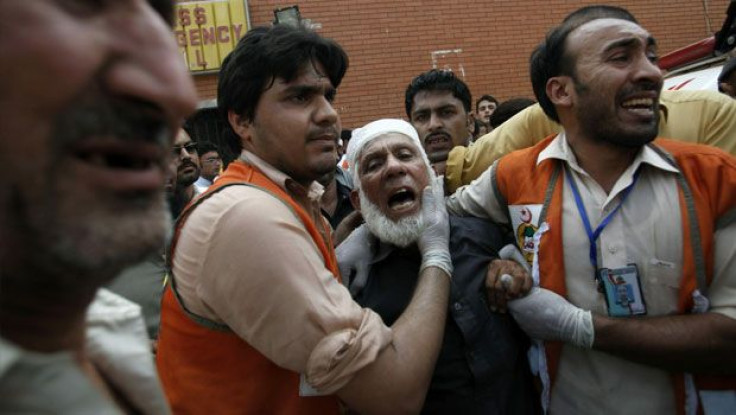Sartaj Khan: The Man Who Lost Fifteen Family Members In Pakistan’s Latest Bombing

Thousands of Pakistani civilians have been killed in a seemingly endless orgy of sectarian violence over the past dozen years or so – but many untold tens of thousands more of their relatives and friends live on with inconsolable loss and sorrow that never abates.
It would be hard to find one person in Pakistan who has suffered more from this mindless bloodshed than 61-year-old Sartaj Khan, a grandfather from the town of Shabqadar in the northwest who lost an astounding 15 family members in a bombing in a Peshawar marketplace, the Qissa Khawani Bazaar, last Sunday – an unspeakable and devastating horror.
Overall, the bomb killed at least 40 people and wounded more than 100. But no one bore more of a loss than Sartaj. He was first notified by mobile phone that his nephew, Sohrab, had died in the blast. When he and his son raced to Peshawar to find his nephew’s body at the hospital, Sartaj uncovered a far greater personal tragedy.
"In the emergency ward, first I saw the body of my youngest son, then my wife, then it seemed like the place was filled only with the bodies of my relatives,” he told BBC. "They were everywhere. I just lost my mind."
BBC listed the macabre toll of family members that Sartaj suddenly lost: Anwara, 49, wife; Meena, 30, daughter; Zainab, 3 months, granddaughter; Adnan, 14, son; Zaiby, 16, daughter; Khalida, 18, daughter; Sadia, 28, daughter-in-law; Hamad, 7, grandson; Junaid, 3, grandson; Sohrab, 22, nephew; Nargis, 50, sister-in-law; Haris, 9, nephew; Mumlika, 23, cousin; Aziz, 4, cousin's son; Shagufta, 17, cousin's daughter.
Beyond this carnage, Sartaj still has five other relatives hospitalized with wounds. On a more mundane basis, the tragedies postponed what was to be a happy occasion, the upcoming wedding of Sartaj's younger son Dilraj, 20. "There was so much happiness in our house," said Sartaj, who works as a laborer. "The ladies and girls bought new clothes. They were laughing as they left. But now they're all gone. Yes, we are poor, but my home was like a garden of roses. With our limited resources, we had a very happy life, but someone has burned my garden and locked it for me."
The Express Tribune newspaper of Pakistan reported that Sartaj actually lost 17 family members if one included his relative Said Afzal, who lost his wife and son in the Peshawar blasts. The Tribune quoted Sartaj’s son, Malak Taj Khan (father of one of the dead children), as saying: “I am ruined. All of my family has died except for this little one [referring to son Hamza] who was ill and didn’t accompany the family [to the bazaar].”
From Malak Taj’s perspective, he lost his wife, two young sons, mother, a brother and sisters. “Who will now call me uncle?” cried Malak Taj’s brother, Mimraj Khan, a day laborer. “My young nephews, my mother, my brother, my sisters, and my sister-in-law are all dead. Who will look after the shattered family now?”
As grave as the latest bombing was, Peshawar, which is near the Afghan border, has suffered three such deadly strikes in only a week. Militants allied to the Taliban and al-Qaeda operate in the nearby semi-autonomous tribal belt.
Prime Minister Nawaz Sharif, who was in New York to attend the United Nations General Assembly, condemned the Peshawar bombing. “Those involved in the killing of innocent people are devoid of humanity and all religions,” he said in a statement released by his office. But Sharif has been criticized for calling for peace negotiations with militants groups like the Taliban. A string of more such attacks might make that avenue impossible to pursue.
© Copyright IBTimes 2024. All rights reserved.











